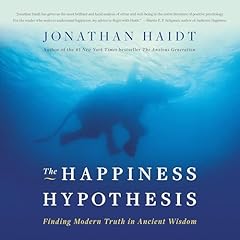
Wisdom
From Philosophy to Neuroscience
No se pudo agregar al carrito
Add to Cart failed.
Error al Agregar a Lista de Deseos.
Error al eliminar de la lista de deseos.
Error al añadir a tu biblioteca
Error al seguir el podcast
Error al dejar de seguir el podcast
 Exclusivo para miembros Prime: ¿Nuevo en Audible? Obtén 2 audiolibros gratis con tu prueba.
Exclusivo para miembros Prime: ¿Nuevo en Audible? Obtén 2 audiolibros gratis con tu prueba.Compra ahora por $21.00
-
Narrado por:
-
L. J. Ganser
-
De:
-
Stephen S. Hall
Here is a compelling investigation into one of our most coveted and cherished ideals, and the efforts of modern science to penetrate the mysterious nature of this timeless virtue. We all recognize wisdom, but defining it is more elusive. In this fascinating journey from philosophy to science, Stephen S. Hall gives us a dramatic history of wisdom, from its sudden emergence in four different locations (Greece, China, Israel, and India) in the fifth century B.C. to its modern manifestations in education, politics, and the workplace.
We learn how wisdom became the provenance of philosophy and religion through its embodiment in individuals such as Buddha, Confucius, and Jesus; how it has consistently been a catalyst for social change; and how revelatory work in the last 50 years by psychologists, economists, and neuroscientists has begun to shed light on the biology of cognitive traits long associated with wisdom and, in doing so, begun to suggest how we might cultivate it.
Hall explores the neural mechanisms for wise decision making; the conflict between the emotional and cognitive parts of the brain; the development of compassion, humility, and empathy; the effect of adversity and the impact of early-life stress on the development of wisdom; and how we can learn to optimize our future choices and future selves. Hall's bracing exploration of the science of wisdom allows us to see this ancient virtue with fresh eyes, yet also makes clear that despite modern science's most powerful efforts, wisdom continues to elude easy understanding.
©2010 Stephen S. Hall (P)2010 Audible, Inc.Los oyentes también disfrutaron:




















Reseñas de la Crítica
By listening to this book, I could not but ponder on the subject of wisdom and how hard it is do define it. The author brings out many examples all valid and non monopolising on the subject.
It is almost, that wisdom is that, that one strives to achieve but never believes he's reached it. No one can call himself wise, only others can attribute this virtue, and this probably makes it the most humble, and valuable achievement of life.
This book makes you think, and for that, it ranks among the best.
A wise book about wisdom
Se ha producido un error. Vuelve a intentarlo dentro de unos minutos.
It goes on and on, also misrepresenting the libertarian view that 'a tyrant about who anyone but libertarians would recognize it is self interest run amok'. Forgetting that tyrants have always acted in the name of the undefinable public good and altruism. Communist dictators all justified their altruistic punishment by the public good and killed about 200 million people worldwide in the 20th century (democide). The author shows experiments that people flock to a society in which their is altruistic punishment, yet in communism people had to be fenced in, otherwise they would flee. Off course these laboratory experiments forgot that the altruistic punisher is in practice selfish, corruptible and violent.
He wonders why humans, unlike baboons, have developed morals, to accomplish that the alpha male does not take resources from the weak. My president alpha male baboon however takes more of my resources than any regular baboon ever could, exactly with his moral system backed up with coercion and violence. The remaining portions of my money I can spend on companies regulated by this baboon.
a lot of folly
Se ha producido un error. Vuelve a intentarlo dentro de unos minutos.


